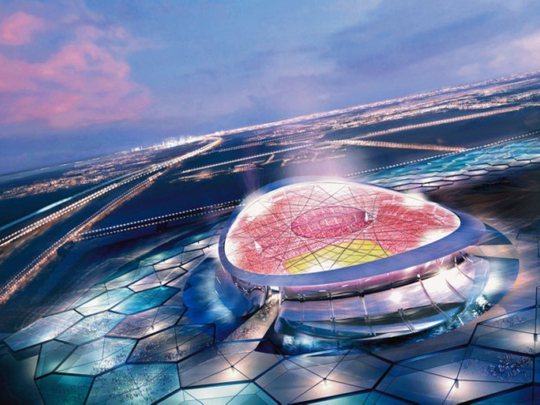
Construction
Rome was built over many years thanks to a civilisation-defining era of politico-economic dominance. This is not a luxury the Qataris have. They have to build nine eco-efficient, cooled football pitches to international standard in just over eight years.
Similar to Roman rule though, Qatar allegedly has a disgruntled workforce. Public attention has been brought to focus on working conditions on building sites in Qatar.
A Guardian report in October claimed at least 44 workers died between June 4 and August 8 due to heart-related issues or workplace accidents. The report found evidence of forced labour on a major World Cup infrastructure project and that some workers had not been paid for months. The International Trade Union Confederation warns that up to 4,000 migrant workers could die before the opening ceremony, while Amnesty International has revealed wide-ranging mistreatment of workers who are held by their employers under the kafala (sponsorship) system.
Hassan Al Thawadi, Head of Qatar’s organising committee, said concerns were being addressed. “It’s not a World Cup being built on the blood of innocents,” he said. “That is unacceptable to anybody.”
Last month, the committee, which rejects claims of slavery-style conditions on construction sites in the world’s wealthiest nation per Construction Climate Corruption capita, pledged to impose respect for workers’ rights. Amnesty secretary general Salil Shetty said the body had met Qatari officials who were “very willing to recognise that there is a problem and... strongly oriented to find solutions,” AFP reported.
That Qatar is willing to address — and rectify — these allegations highlights one reason for its successful bid: if any country can build 12 stadiums in nine years, Qatar can.
Changes: Fifa President Sepp Blatter, a stout defender of Qatar’s right to host in 2022, said the country must meet the expected standards or risk losing the event entirely. After meeting the Emir of Qatar, Shaikh Tamim Bin Hamad Bin Khalifa Al Thani, Blatter said that things are “on the right track”.
Consequences: Changes to the way Qatar constructs its stadiums could change the way major infrastructure projects in the region are undertaken now the global media has its attention on workers’ rights and on the methods used in projects
of a similar scale.
Climate
If you can’t stand the heat, get out of the dust bowl. In an unfortunate twist of proverbial fate, that’s not an option footballers or fans in 2022 will have.
Sepp Blatter, the often-controversial Fifa President, has already told Qatari organisers that they won’t be stripped of the tournament under any circumstances.
Changes: Michel D’Hooghe, Chairman of Fifa’s medical committee, has said the risks posed to supporters and athletes due to extreme heat are too great for the
World Cup to be held in the Qatari summer, where temperatures can soar to 50 degrees Celsius.
Blatter, who has backed a winter event, said: “We are now consulting the stakeholders — teams, players, leagues, federations — about the international calendar, media and marketing, to look at if it’s possible to play at the end of the year.”
However, he doesn’t expect a firm decision until the end of 2014.
Consequences: The English Premier League opposes change because of the disruption it would cause to the world’s most domestic popular league.
There is also a contention of an unfair bid: if the US, Australia and South Korea knew the World Cup could be held in winter, they would have had other ways to woo Fifa.
Corruption
The on-off merry-go-round that Fifa’s executive committee (Exco) has become in the years succeeding
Qatar’s World Cup bid has indelibly smeared the bidding process.
The life ban imposed on Mohammed Bin Hammam, the former Qatari Exco member and Fifa presidential candidate, is perhaps the most high-profile to date.
Under Fifa’s new code of ethics for violation of Article 19 (conflict of interest), Bin Hammam has been permanently expelled from football following a report by the ethics committee into his terms as AFC president and as member of the Fifa Exco in the years 2008-2011. This came after his previous accusations
of bribery were overturned.
The 64-year-old was found by the court of arbitration for sport last year to “more likely than not” have brought money that was offered to Fifa delegates at two meetings in May 2011.
Changes: Blatter has since reformed the Fifa legislative make-up so that bribery and corruption cannot manifest themselves. But prior to the 2022 bid, this infrastructure was not in place.
Guardian football correspondent David Conn wrote that the only reasonable thing to do is recast the vote under this new code of ethics.
Consequences: A revote would see the country that is ready on all levels to host a World Cup win the bid, and the focus would shift to where it should: football.







